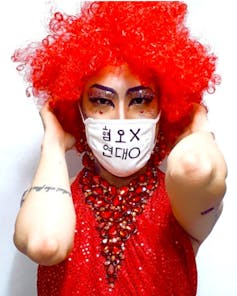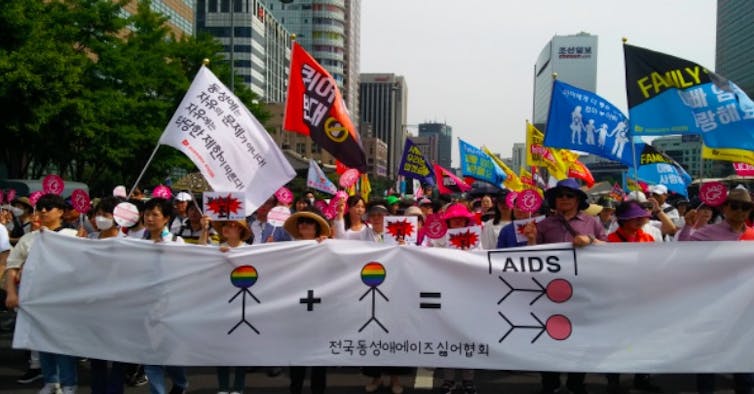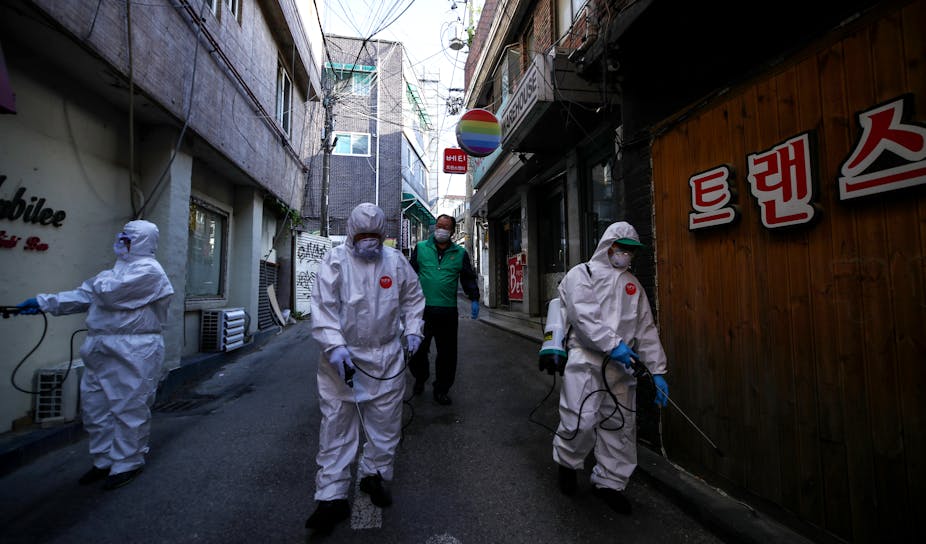The Korean LGBTQ+ community knew to prepare for an anti-gay onslaught after it emerged that a person with an asymptomatic COVID-19 infection had been partying in Itaewon, a gay nightlife district in the South Korean capital, Seoul. The community is used to being shamed for just living their lives or blamed for spreading disease.
While Seoul’s Jongno district caters particularly for gay men in the form of restaurants and bars, Itaewon offers a convenient concentration of gay clubs and dancehalls. The story of COVID-19 infections in Itaewon originated from King Club, which posted on social media on May 7 that a customer had been diagnosed with COVID-19 and that the venue had been disinfected.
News of at least 100 other infections linked to the nightclub then sparked a homophobic backlash against the LGBTQ+ community, feeding into a long history of stigma driven by the country’s Protestant right.
Queer Seoul
Being a sexual minority in Korea is not illegal, and transgender people are able to transition. But there is no recognition of same-sex partnerships (marriage or otherwise) and the absence of comprehensive anti-discrimination legislation means that the rights of sexual minorities are largely unprotected.
Both gay men and trans-people continue to experience discrimination in the military, and anal sex between military personnel can be prosecuted and lead up to two years in prison. This is a big problem in a country with mandatory conscription.
Still, in many respects LGBTQ+ people are able to live with relative freedom. Locations and events all over Seoul cater for the community. There are queer theatre groups and bookstores, queer sex-toy shops, restaurants and cafes – some of them officially gay, others unofficially so.
Seoul holds an annual Queer Pride parade and two queer-themed film festivals. All of this is possible thanks to the numerous activist groups and organisations, the oldest of which date back to the late 1980s.

There are dating apps, websites and online “cafes” that are extremely popular and not as censored or dangerous to use as in some other parts of the world. As a result, while some LGBTQ+ individuals choose not to “come out” to their families, others do. Simultaneously there is a sentiment among the community that a western practice of coming out might be unnecessary, that queerness and family can be negotiated differently.
Outside of the Korean LGBTQ+ bubble, there is a widespread belief, embedded into the understanding of the heterosexual general public that homosexuality does not exist in Korea. Or if it does, not in large numbers. LGBTQ+ activists work relentlessly to change this view and fight for their rights. However, achieving tangible results is slow. Mainly because they are fighting against a formidable force of conservative Christians.
Role of the Protestant right
Korea’s LGBTQ+ community is still actively being accused of spreading AIDS and endangering the Korean nation. This toxic narrative is propagated by the Korean Protestant right, a subset of Protestant Christianity that combines conservative evangelical theology with social and political conservatism.
An estimation of the Protestant right’s size can be seen in the Christian Council of Korea, the largest Protestant Christian alliance with reportedly more than 12 million members. Since 2015, it has organised large anti-gay rallies all over the country and succeeded in blocking proposals for anti-discrimination legislation in 2007, 2011 and 2013.

Blamed for coronavirus
In this context, it’s not surprising that the Protestant right would replace HIV with COVID-19, when presented with the opportunity.
When the King Club announced on social media that one of its customers had been diagnosed with COVID-19, the news was picked up by Kukmin Daily, a local paper with links to Protestant churches. Soon after its publication, Kukmin Daily’s article was distributed by other media, sparking a homophobic backlash online against the queer community.
As it stands, for gay men in particular, getting tested for COVID-19 in Seoul risks being outed. To be outed risks losing jobs, friends, even family.
Despite South Korea’s conservative values, under normal circumstances sexual minorities would be able to access healthcare like any other citizen. Now, due to the media frenzy, they face a choice between risking their health versus everything else.

